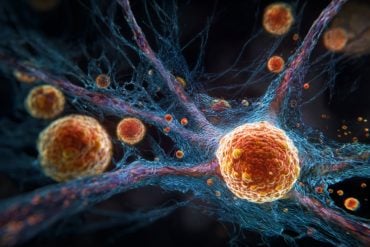Summary: A review of 71 studies over 40 years aligns with the hypothesis that belief in the paranormal is associated with differences and deficits in cognitive function.
Source: PLOS
In a review of 71 studies that explored links between belief in paranormal phenomena and cognitive function, most of the findings align with the hypothesis that such beliefs are associated with cognitive differences or deficits.
Charlotte E. Dean and colleagues at the University of Hertfordshire, U.K., present this evaluation in the open-access journal PLOS ONE.
For several decades, researchers have examined potential links between cognitive functioning and belief in paranormal phenomena, such as psychokinesis, hauntings, and clairvoyance. However, about 30 years have passed since a non-systematic review of this literature was last conducted.
To provide updated insights into the findings and quality of studies on this topic, Dean and colleagues systematically identified and evaluated 70 published studies and one unpublished doctoral thesis produced between 1980 and 2020.
The 71 studies explored a range of cognitive functions, such as reasoning ability, thinking style, and memory.
Overall, the findings align with the hypothesis that beliefs in paranormal phenomena are associated with differences or deficits in cognitive function. For example, a particularly consistent association was found between paranormal beliefs and an intuitive thinking style.
The review found that most of the 71 studies were of good methodological quality and that quality has improved over time; for instance, most had clear objectives and appropriate study designs.
However, certain areas for improvement emerged; for instance, many studies lacked a discussion of their own methodological limitations, and undergraduate students made up a large portion of study participants, meaning that the findings may not necessarily apply to the general population.

The authors note that no specific profile of cognitive functioning for paranormal believers has emerged from this literature. They suggest that future research could not only address the methodological weaknesses they observed, but also explore the possibility that paranormal beliefs might be associated with a more overarching difference of cognition—which could help explain why past studies have found links with seemingly disparate types of cognitive dysfunction.
The authors add: “Four decades of research suggests that belief in the paranormal is linked to our degree of cognitive flexibility and fluid intelligence; however, methodological improvements in future research are required to further our understanding of the relationship.”
About this psychology and cognition research news
Author: Press Office
Source: PLOS
Contact: Press Office – PLOS
Image: The image is in the public domain
Original Research: Open access.
“Paranormal beliefs and cognitive function: A systematic review and assessment of study quality across four decades of research” by Charlotte E. Dean et al. PLOS ONE
Abstract
Paranormal beliefs and cognitive function: A systematic review and assessment of study quality across four decades of research
Background
Research into paranormal beliefs and cognitive functioning has expanded considerably since the last review almost 30 years ago, prompting the need for a comprehensive review. The current systematic review aims to identify the reported associations between paranormal beliefs and cognitive functioning, and to assess study quality.
Method
We searched four databases (Scopus, ScienceDirect, SpringerLink, and OpenGrey) from inception until May 2021. Inclusion criteria comprised papers published in English that contained original data assessing paranormal beliefs and cognitive function in healthy adult samples. Study quality and risk of bias was assessed using the Appraisal tool for Cross-Sectional Studies (AXIS) and results were synthesised through narrative review.
The review adhered to the Preferred Reporting Items for Systematic Reviews and Meta-Analyses (PRISMA) guidelines and was preregistered as part of a larger registration on the Open Science Framework (https://osf.io/uzm5v).
Results
From 475 identified studies, 71 (n = 20,993) met our inclusion criteria. Studies were subsequently divided into the following six categories: perceptual and cognitive biases (k = 19, n = 3,397), reasoning (k = 17, n = 9,661), intelligence, critical thinking, and academic ability (k = 12, n = 2,657), thinking style (k = 13, n = 4,100), executive function and memory (k = 6, n = 810), and other cognitive functions (k = 4, n = 368).
Study quality was rated as good-to-strong for 75% of studies and appears to be improving across time. Nonetheless, we identified areas of methodological weakness including: the lack of preregistration, discussion of limitations, a-priori justification of sample size, assessment of nonrespondents, and the failure to adjust for multiple testing.
Over 60% of studies have recruited undergraduates and 30% exclusively psychology undergraduates, which raises doubt about external validity. Our narrative synthesis indicates high heterogeneity of study findings.
The most consistent associations emerge for paranormal beliefs with increased intuitive thinking and confirmatory bias, and reduced conditional reasoning ability and perception of randomness.
Conclusions
Although study quality is good, areas of methodological weakness exist. In addressing these methodological issues, we propose that authors engage with preregistration of data collection and analysis procedures. At a conceptual level, we argue poorer cognitive performance across seemingly disparate cognitive domains might reflect the influence of an over-arching executive dysfunction.







